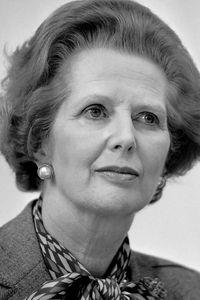Margaret Hilda Thatcher, Baroness Thatcher, LG, OM, DStJ, PC, FRS, HonFRSC, was a British stateswoman and Conservative politician who served as Prime Minister of the United Kingdom from 1979 to 1990 and Leader of the Conservative Party from 1975 to 1990.
Born Margaret Hilda Roberts on October 13, 1925, she was the first woman to hold the position of Prime Minister. As Prime Minister, she implemented economic policies known as Thatcherism, which emphasized individual liberty, privatization, and reducing the power of trade unions.
Thatcher studied chemistry at Somerville College, Oxford, and worked briefly as a research chemist before becoming a barrister. She was elected Member of Parliament for Finchley in 1959 and later served as Secretary of State for Education and Science in the 1970-1974 government.
In 1975, she defeated Edward Heath in the Conservative Party leadership election, becoming the first woman to lead a major political party in the UK. As Prime Minister, she introduced a series of economic policies aimed at reversing high inflation and Britain's struggles in the wake of the Winter of Discontent and an oncoming recession.
Her political philosophy and economic policies emphasized individual liberty, privatization, and reducing the power of trade unions. She was known for her uncompromising politics and leadership style, earning her the nickname "Iron Lady".
Thatcher's popularity waned amid recession and rising unemployment, but she recovered with victories in the 1982 Falklands War and the recovering economy. She survived an assassination attempt by the Provisional IRA in the 1984 Brighton hotel bombing and achieved a political victory against the National Union of Mineworkers in the 1984-1985 miners' strike.
In 1986, she oversaw the deregulation of UK financial markets, leading to an economic boom, known as the Big Bang. She was re-elected for a third term with a landslide in 1987, but her subsequent support for the Community Charge and increasingly Eurosceptic views were widely unpopular.
Thatcher resigned as Prime Minister and party leader in 1990, after a challenge was launched to her leadership, and was succeeded by John Major. After retiring from the Commons in 1992, she was given a life peerage as Baroness Thatcher, which entitled her to sit in the House of Lords. She died of a stroke at the Ritz Hotel, London, on April 8, 2013, at the age of 87.
Thatcher's legacy is complex and continues to be debated, with some viewing her as a polarizing figure who realigned British politics towards neoliberal policies, while others see her as a transformative leader who brought stability and prosperity to the UK.



































































